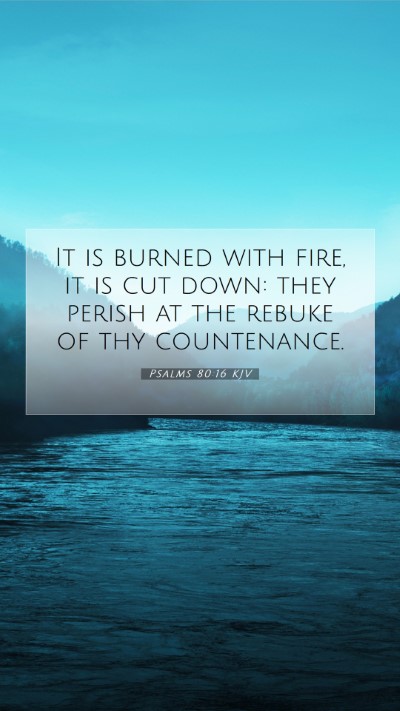Psalms 80:16 - Biblical Meaning and Commentary
Psalms 80:16 states: "It is burned with fire; it is cut down: they perish at the rebuke of thy countenance."
This verse conveys a profound message regarding divine judgment and the consequences of turning away from God's guidance. The imagery of fire and destruction serves as a powerful metaphor for the fate of the unfaithful and the overall peril of neglecting spiritual clarity. Below, we delve into the meanings, interpretations, and analyses from reputable public domain commentaries.
Summary of Commentary Insights
-
Matthew Henry's Commentary:
Matthew Henry interprets this verse as a lamentation over the destruction caused by God's anger. He emphasizes the significance of God's presence (His countenance) in the fate of people and nations. Henry highlights that those who stray from righteousness face severe repercussions, and divine wrath often manifests in their downfall. The fire symbolizes both purification and destruction, indicating that judgment must come to those who refuse to return to God's path.
-
Albert Barnes' Notes:
Albert Barnes offers a detailed theological perspective, asserting that the "fire" mentioned in the verse reflects God's judgment on the people who have disregarded His commands. Barnes elaborates on the agricultural context, noting that when the vine (symbolizing Israel) suffers destruction, it reflects the people's spiritual decline. Each nation's vitality, in this view, hinges on how it heeds divine instruction. The mention of cutting down reinforces the finality of divine judgment.
-
Adam Clarke's Commentary:
Adam Clarke provides insights into the cultural context behind this psalm. He posits that the passage serves as a call for restoration. Clarke notes that the imagery of burning and cutting signifies the devastating impact of sin and lack of obedience. God’s rebuke is seen as not merely punitive but aimed at re-establishing the relationship between Him and His people. This verse reminds believers of the severe spiritual and physical consequences of disobedience.
Understanding the Theological Significance
The verse encapsulates the theme of divine retribution, illustrating how straying from God's will leads to destruction. It serves as a cautionary reminder for contemporary readers about the importance of remaining steadfast in faith. In theological discourse, it invites reflection on how God's justice operates in the world, especially concerning nations and communities.
Spiritual Applications
In daily application, this verse encourages believers to evaluate their spiritual lives continually. The consequences of disregarding God can manifest in various ways, including personal turmoil and broader societal issues. The call is to seek God's favor and restore the connection that may have been severed by sin. For study groups and individuals, a pertinent application is engaging in proactive spiritual disciplines that prioritize obedience and alignment with God's will.
Cross References
- Isaiah 5:5-6 - The vineyard imagery parallels the theme of divine judgment and the consequences of disobedience.
- John 15:6 - Jesus speaks of branches being thrown away if they do not remain in Him, reflecting similar themes of divine consequences.
- Hebrews 12:29 - God is described as a consuming fire, affirming the potency of His judgment and holiness.
Conclusion
In summary, Psalms 80:16 serves as a significant reminder of the relationship between divine providence and human obedience. It challenges readers to reflect on the state of their spiritual lives and the recognition that straying away from God's directives can lead to dire consequences. Understanding this verse through the insights of respected commentaries enriches our comprehension of Scripture and equips us for deeper Bible study and personal application.


